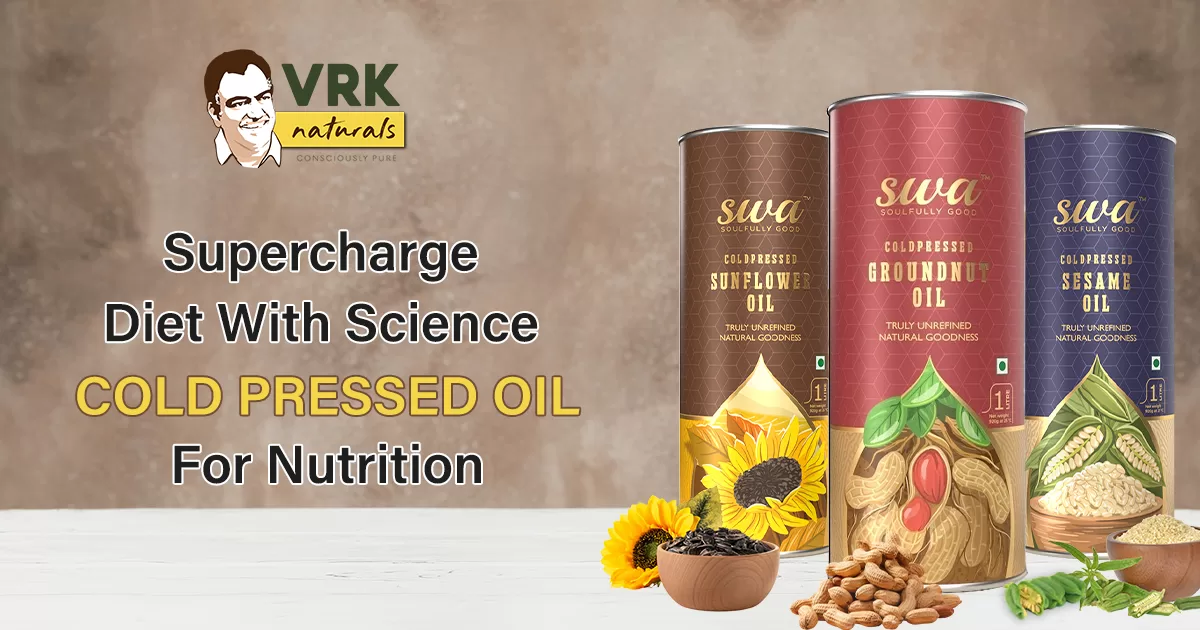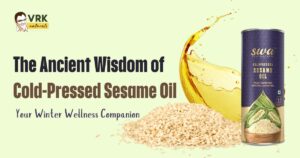Cold pressed oils have developed a reputation in the health and wellness industry for their nutrient rich composition and potential health advantages. Cold pressed oil is becoming increasingly popular as a culinary component. It is used regularly to prepare a variety of items such as salads, snacks, and main meals. As a result, it is essential to choose the proper oil to preserve all of the necessary elements and vitamins for good health. Cold pressing is extracting oil from fruits and vegetables that do not utilize heat, preserving vital vitamins, enzymes, and antioxidants.
So, if you want a healthy choice for cooking or other uses, cold pressed oil is the ideal example. It is entirely pure and natural, with no additives or preservatives. But what is the science underlying cold pressing, and how does it keep nutrients intact? Let’s have a look at the exciting realm of this procedure.
What Is Cold Pressed Oil?
Cold pressed oil is oil extracted from nuts or seeds without heat or chemical solvents. This indicates that the oil has been cold pressed, thus the name. The temperature does not rise too high during extraction, which might harm the materials. Although heat is generated during the pressing process, it must remain below 49 °C (120 °F) for the oil to be classified as the best cold pressed oil.
Oils derived in this manner retain their inherent taste, fragrance, and nutrients. Cold pressing retains the oil’s nutrients, antioxidants, and enzymes, making it a more “natural” alternative.
The Fundamentals of Cold Pressing
Cold pressing is also known as hydraulic pressing or high-pressure processing (HPP). It is a juicing method that involves extracting liquid from nuts, seeds, fruits, and vegetables using a hydraulic press. Cold pressing, as opposed to standard centrifugal or heat-based juicing, operates at low temperatures and high pressure. Cold pressed oils in India might be trending at this time, but the traditional way of extracting oils from seeds and nuts has always been a cold press process. The following steps are included in the procedure:
- Maceration: The nuts and seeds are coarsely chopped or mashed into a pulp during maceration. This procedure breaks down the cell walls, simplifying removing the juice or oil.
- Pressing: The pulp is placed in a hydraulic press, which employs high pressure to extract the oil. This pressure exerted by a cold pressed oil machine can range from 2,000 pounds to 87,000 pounds per square inch (psi).
- Filtration: The extracted oil is eventually filtered to eliminate any remaining particles.
- Bottling: The resulting oil is often bottled and treated to high-pressure processing to remove potentially hazardous germs while keeping nutritional content.
Different types of cold-pressed oils
Traditional Indian cuisine utilized ghee, refined mustard, or refined coconut oils. However, there has been a trend toward a healthier diet, necessitating cold pressed oil for cooking in recent decades. Here are a few of the cold pressed oils that have found their way into Indian kitchens.
-
Cold Pressed Sesame Oil
Cold pressed sesame oil is majorly used in Indian and oriental cooking. This healthy and sweet oil is exceptionally loaded with nutrients, primarily when extracted by the cold pressed technique. Cold pressed sesame oil benefits us greatly as it is excellent for bone health, lowers inflammation, and has heart healthy nutrients. This oil finds its use in making desserts, stir fried dishes, pickles, meat dishes, and salads.
- Cold Pressed Sunflower Oil
Cold pressed sunflower oil is an abundant source of essential nutrients. Cold pressed sunflower oil benefits us immensely since it contains a lot of vitamin E, an excellent antioxidant that protects the human body from damaging free radicals. It also includes monounsaturated and polyunsaturated fatty acids, known for their benefits on cardiovascular health. Moreover, this cold pressed oil is also a good source of vitamins A and K, contributing to optimal nutrition. A tablespoon of this golden oil adds nutritional value and richness to your meals while giving them a delicious flavor.
-
Cold Pressed Coconut Oil
Wood cold pressed coconut oil, a culinary delight of Southern India, is rich in MCTs (medium-chain triglycerides), which enhances the blood’s HDL (good) cholesterol level and improves heart health if ingested in moderation. Furthermore, cold pressed coconut oil also contains lauric acid, an antimicrobial active fat that helps protect from infections; the same acid is found in breast milk, protecting the baby from infections. Cold pressed coconut oil can withstand high temperatures without losing efficacy, making it suitable for cooking a complete nutrition diet and everyday desi meals.
-
Cold Pressed Groundnut Oil
The best cold pressed groundnut oil is yet another preferred cooking oil, as it preserves nutrients and has tremendous health advantages. This cold pressed oil is high in MUFA, PUFA, and vitamins A, D, and E, which help lower LDL and improve heart health, lowering the risk of strokes and heart attacks when taken in moderation. This oil is an excellent choice for Indian cuisine due to its high smoking point. And this flavourful oil is a perfect option for making authentic Indian pickles.
Conclusion
Cold pressed oils are gaining popularity thanks to the stated cold pressed oil benefits and natural extraction methods. They may be found in several locations, including health food stores, online sellers, supermarkets, and restaurants. These oils are carefully extracted to preserve their natural deliciousness and are devoid of trans fats and cholesterol. Opt for cold pressed oils for trust, purity, and credibility. Our cold pressed oils ensure a great culinary experience while boosting general well-being by utilizing only the highest quality raw materials. Check out the VRK diet for a well planned weight loss diet for physical and mental well-being.







